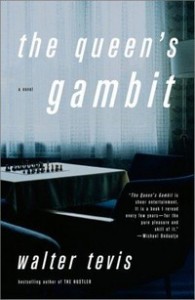The only low-water bridge to our neighborhood was under lots of (fast) water this afternoon. Had to hike up the back way.
Monthly Archives: May 2013
Scott Adams: Virtual People
“My generation is the last of the pure humans. Most people my age were raised with no personal technology. Someday historians will mark the smartphone era as the beginning of the Cyborg Age. From this day on, most kids in developed countries will be part human and part machine. As technology improves, we will keep adding it to our bodies.”
Learn Guitar with David Brent (Ricky Gervais)
78 square foot mini-studio
The Queen’s Gambit
 This is a thriller about tournament chess. The tournaments aren’t just background for a more exciting plot, the chess games are the action. Piece-by-piece. Don’t play chess? (I don’t) Doesn’t matter, I was on the edge of my seat. (Wikipedia)
This is a thriller about tournament chess. The tournaments aren’t just background for a more exciting plot, the chess games are the action. Piece-by-piece. Don’t play chess? (I don’t) Doesn’t matter, I was on the edge of my seat. (Wikipedia)
As with the only other novel I’ve ready by Walter Tevis (Mockingbird), I felt a sense of impending doom on every page of this story. I was exhausted by the end. I didn’t read closely enough to learn if Tevis was a chess player. Hard to image writing this story if he wasn’t.
If there was a false note, for me it was the main character’s struggle with alcohol and pills. According to Wikipedia, the author had the same struggle. This element just seemed “tacked on” to me.
[I was reminded of the drinking binges (and hang-overs) of Matthew Scudder, the alcoholic detective created by Lawrence Block. It was hard to read those without a cold cloth on the back of your neck.]
Dignity in doing other things
“There’s a couple of arguments against the idea that AI is coming soon. One is, as you say, a philosophical argument, which boils down to “However smart machines seem to get, they’ll never have true human intelligence.” I just don’t think that matters. You can call it intelligence or something difference, but that’s semantic. What matters is that they can accomplish the same things humans can.”
“So who has all the money? It’s whoever has the robots. And who has the robots? The people who have all the money. Today’s income inequality will be peanuts compared to income inequality then. […] If I’m right about what happens with artificial intelligence, there won’t be any work, period, so there won’t be dignity in work. We’ll have to find dignity in doing other things.”
Flying by iPad

Barb had a meeting in Kansas City today and the client sent the company plane to fetch her (and save a few billable hours, I assume). She snapped this photo of the pilot’s iPad. I shared this on Google+ where Bisbo (a pilot for Southwest) posted the following comment:
“The major airlines are starting to go to this, and slowly moving away from paper charts. With it tied into GPS, you can see your position along the route, and you can also overlay weather radar information from the NWS. In fact, I often get much better weather information form my First Officer’s iPhone than I do from dispatch.”
The Retirement Myth
“Only 58% of us are even saving for retirement in the first place. Of that group, 60% have less than $25,000 put away … a full 30% have less than $1,000.” According to Nielsen Claritas, Americans age 55 to 64 have a median net worth of $180,000 — less than they’ll likely need for health care spending alone during retirement. — According to ConvergEx Group
“The entire concept of retirement is unique to the late-20th century. Before World War II, most Americans worked until they died.”
“According to the Centers for Disease Control’s actuary tables, someone born in 1950 could expect to live to age 68.2, while someone born in 2010 could expect to live to 78.7.”
Scott Adams: Privacy
“At some point, every home that has a security system will have video as a component. Law enforcement will know who comes and goes through nearly every front door.”
“In twenty years, the government will always know where your car is, the same way they can track your phone. Taxis will someday only take credit cards. Busses and trains will require you to swipe an ID, and so on. If you travel, the government will know where you went and how you got there.”
“Imagine, for example, having a smartphone, an iWatch, and a smart car. When you go to the store, the cashier will someday automatically know that you, your car, your watch, and your phone are all in the same place. That is nearly a 100% identity check. When you approach the cash register, I can imagine your phone automatically identifying itself and pulling up your photo on the register.”
Your head would explode
“I now see all instances of minor physical discomfort as a chance to get better at being relaxed. I relax into the discomfort, I let it hang out with me. When you first try it it’s an exhilarating experiment — to voluntarily open up to minor pain when that’s what the moment brings you, to refrain from listening to the impulse to cringe or harden. It feels like you’re walking freely in an area you thought you weren’t allowed to go.”
“The present moment is the only concrete reality you will ever have to deal with. Sometimes it contains pain. We prefer that our realities don’t contain pain. But that can only ever be a preference, because ultimately we don’t have control over the present once it becomes the present. If you truly needed reality to be something other than reality, your head would explode that instant. But it doesn’t. You prefer it to be one way, but don’t need it to be.”
